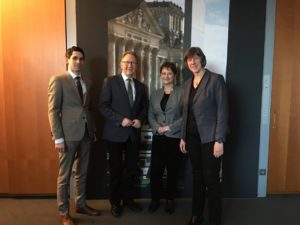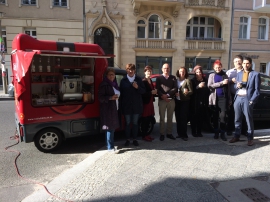In Berlin, the honorary activity card is awarded to those who have volunteered at least 10 hours a month or 120 hours a year over the past five years and plan to continue their involvement.
Sonja Arens presented me with the honorary card at the doctor-patient dialogue at the DRK Klinikum Westend. Thanks for that! Somehow it was strange for me to receive an honour in this form, but it was reason enough to look back over fifteen years. We are cheerful when we meet, the laughter lives right next to the crying, there were evenings when, in all seriousness, I just packed myself away. I have experienced an exclusion from the group, also the departure of a speaker before the end of her presentation because she had not kept to the agreement not to do a sales event. Countless, many funny evenings, just as many that were borne of the suffering of those affected. Christmas parties, summer meetings, unfortunately also a sad case, laughing and crying simply belong together, living next to each other.
No one starts a support group without reason, but because they feel there is a need to exchange live and in colour, face to face. Internet was still rare back then, no one had a PC, not to mention that there were no flat rates yet and the search for help and self-help had a different quality. I myself darkly remember that after I had the diagnosis, I had called somewhere in the north of our republic about it in search of information, in order to get additional information. It was thanks to a stupid circumstance that I received the final diagnosis of Crohn’s disease through the phone. For me it was okay, because at the personal appointment beforehand it was already clear that it was either Crohn’s disease or ulcerative colitis. The woman on the phone then exclaimed in horror, “Oh dear, you poor thing, get ready for operations and this or that!” That was at the beginning of 1997. Fortunately, nothing can upset me that quickly, but somehow I thought the performance on the phone was “very successful” and that stuck. Despite the unsettled course of events, I have not had an operation until today, as an unshakeable optimist, I assume that it will stay that way, knowing full well that I can turn the tide very quickly.
Then the time had come, after I had already informed myself for a while, done some preliminary work and found a room, the first meeting took place on the second Tuesday in May 2001 and Jan, who was there at the time, was immediately in the boat, from which he unfortunately got out again at some point. Over the years, the group has moulted, had to cope with some setbacks and is currently experiencing a small renaissance. I have to admit that it is fun to look for speakers for the group from time to time, not only medical doctors, but also therapists come to speak, and they come to us without any fee. Okay they get a cup of coffee or tea and have to endure my homemade cake, which has become a bit of a tradition by now. I always look forward to the 2nd Tuesday of the month, to everyone who belongs to the group or is new to it.
What I criticise overall and absolutely do not understand is the lack of willingness to join the DCCV, given the number of affected people in our country, there could be significantly more. For what the association has achieved during the last fifteen years, the contribution of 60 euros p.a. is absolutely worth it, above all, in the contribution you also pay for legal protection insurance, which kicks in when you have problems in social areas of life. It couldn’t be cheaper. I know this because I have already had to make use of it twice, once against the state pension office, the other time against the pension insurance. I don’t know why people hesitate to join the association. It is not political, even though it lobbies hard, without which we would have looked pretty old in some places, because laws and regulations would have been or have been passed to our disadvantage, which could then be corrected at least partially or completely. It is not about printing the “Bauchredner”, about shaping the APs with the doctors, but about standing up for us to the legislators, about representing us where desk activists make up anything without thinking of the consequences for affected, sick people Such desk acrobats would, without this lobbying, send us into a roundabout with no exit. The association awards grants for research projects that are designed to get closer to solving the riddle of IBD, that it will eventually be cured. It doesn’t occur to me that these 60 euros per year are being saved. Of course I know that 60 euros can be a lot of money, but for this case you can contact the office. In this context, I remember a conversation I had recently, when it was still summer, with a member of the group whom I hold in very high esteem and who is also, as far as she is able, active on the road. We were out for coffee outside the group evening and she said that everything in life is a give and take and as she had been helped, it was now that she wanted to give. I think there is a lot of truth in that, life is give and take. There is some truth in this.
Attending a SHG is more than collecting information on the internet, it is complementary to the doctor’s consultations, which even today are not always fantastic. Everyone who goes to a SHG has a different way of dealing with “their” disease, can learn knowledge, gets tips, can laugh at themselves as well as at others, discuss what works and what doesn’t and can also pass on their experience, it is a give and take.
Fifteen years and I don’t want to miss any of them.

